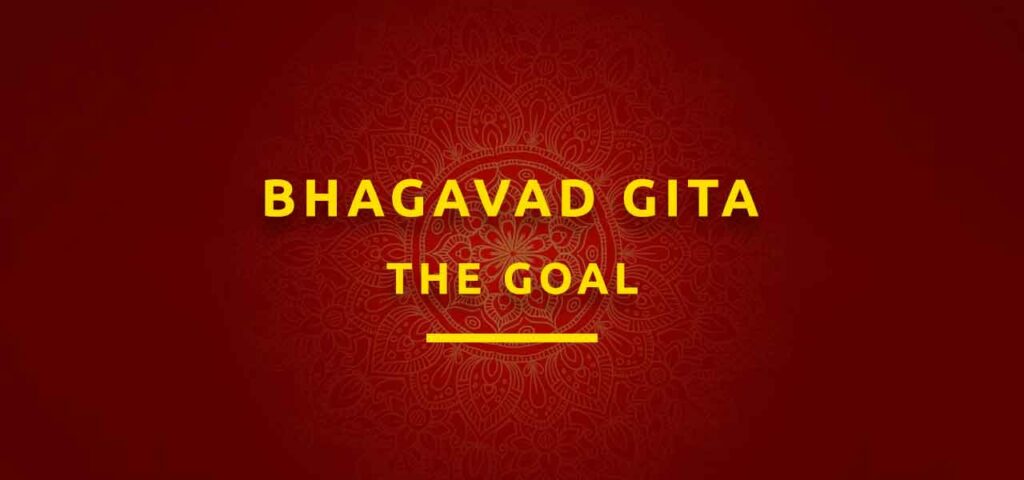Bhagavad Gita aims at spiritual emancipation of mankind. For this purpose, Lord Krishna has prescribed various paths of self-realisation. Though these paths known as yogas focus on different aspects of human life such as gyan yoga on knowledge, karma yoga on work and bhakti yoga on love and devotion ; but all these means of spiritual upliftment seek the same goal i.e. liberation of the soul. Path of Gita is the path of liberation which leads from darkness to light and from a limited existence to limitlessness.
The results which are likely to be achieved by the practice of these yogas have been described in different shlokas of Bhagavad Gita. The expected results are stated to be attaining Brahman (the Absolute), entering into Him, attaining His state of being, remaining forever established in Him ; and becoming eligible for being one with Him. Similarly, in some other shlokas, attaining Krishna (Ishvara – the personal God) is stated to be the desired goal. Further, the goals which have been proclaimed in some other shlokas are attaining perfection, attaining supreme peace, attaining immortality, attaining supreme nirvana, enjoying infinite bliss, being ever free, release from bondage of works, freedom from all miseries arising from material contact, becoming eligible for eternal life, reaching the eternal and imperishable abode ; and reaching the state from where one is not born again. Apart from these, some other similar goals have also been identified in the Gita.
Though Brahman and Ishvara, the Absolute and the personal God, have been mentioned separately in different shlokas of Bhagavad Gita, in essence both represent the same reality i.e. the Divine. Whereas former is the Divine beyond any traits, the latter is the Divine with traits. While Brahman is sat-chit-ananda i.e. eternal truth, eternal consciousness and eternal joy ; Ishvara represents inexhaustible love. Attaining anyone of the two means the same thing i.e. freedom of the soul. Similarly, other goals described in various other shlokas such as attaining supreme peace or enjoying infinite bliss relate only to liberation of the soul.
To put it in simple words, aim of the yoga as prescribed in Bhagavad Gita is to enable one to become unified in consciousness with the Divine in him. This is what is called liberation or freedom of the soul. Anyone who has attained this state of transcendence is yogi, a realised soul. He is ever present in the Divine and the Divine is ever present in him.
Liberation does not mean separation of the immortal soul from the mortal human life but a complete transformation of the life into a better spiritual state. Freedom of the soul is attained not by discarding life but by rendering it pure. When gunas, modes of material nature, are transcended ; the body, the mind and the self do not get dissipated but become more organised. They work in complete harmony with each other.
Whole of the life of the one who has attained freedom is a celebration. It is illumined by the inner light and is guided by the universal vision. His body, mind and the self become instruments of change in the hands of the Divine. His very presence brings about a positive change all around.
Those who have achieved supreme wisdom, instead of giving up the world, prefer to play their due role in fulfilling the purpose of creation. While maintaining the individuality of their body, mind and the self ; such liberated beings live in the universality of the soul. Whatever be their position in the outer world, inwardly they are dwelling in the Supreme. Their inner life is in constant communion with the Eternal. The soul rejoices in the Supersoul. Such freed beings are always at peace with themselves and the world at large.
The realised souls have no need to maintain their distinct identity, but still they keep it of their own choice. For whatever period they live in the physical world, they remain ever engaged in the performance of their worldly duties. But they are not bound by their works.
All the activities of such spiritually blessed souls are without attachment and without any expectation in return. Their activities are not motivated by any selfish purpose but are inspired by the vision of the Supreme. They work for the upliftment of mankind.
The joy and peace of the freed souls is natural and spontaneous. Their happiness is internal and does not depend upon any external factors. Having themselves experienced unalloyed joy and inexhaustible love, they wish to share these blessings with all. They guide the earnest seekers in their spiritual endeavours. They lead by their own example.
The ultimate goal of Bhagavad Gita is the establishment of a universe which is free from ignorance and evil. The Supreme Lord wants to eliminate conflict and grief from the world. Purpose of the creation is achieved when all realise their true nature to be eternal bliss. The struggle for excellence continues until all beings transcend the three modes of material nature and until whole of the creation is illumined by the Divine light.

